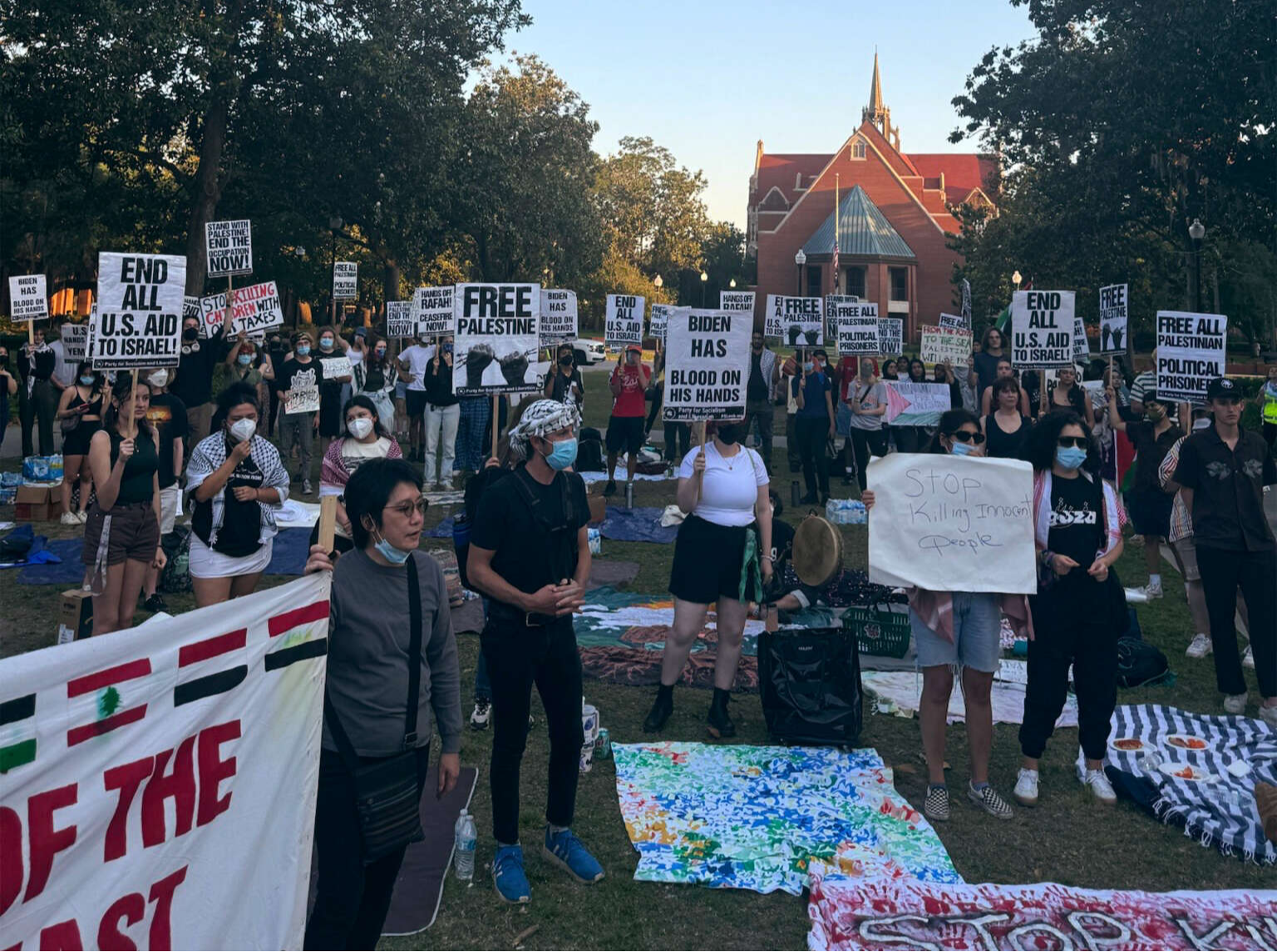
Students protest at University of Florida (UF) in Gainesville, Florida
Tel Aviv, June 1 (RHC)-- Nine so-called survivors of the October 7th attacks on southern Israel have filed a civil suit against anti-war groups in the United States, alleging their advocacy work on college campuses constitutes “material support” for “terrorism.”
But the defendants have pushed back, warning that the case is part of a pattern of legal attacks meant to put pro-Palestinian groups on the defensive and curtail free speech at U.S. universities.
“It is absolutely a threat to free speech, and it’s a threat to free speech on any front, on any issue, not just on Palestine,” said Christina Jump, a lawyer for American Muslims for Palestine (AMP), one of the two defendants in the case.
The lawsuit, filed in a federal court in Virginia, describes how the nine plaintiffs dodged gunfire and lost loved ones during the October 7th attacks, led by the Palestinian group Hamas. It then alleges that AMP and another campus group, National Students for Justice in Palestine (NSJP), acted as “Hamas’s propaganda division”, targeting U.S. students.
The lawsuit says that AMP and NSJP worked to “recruit uninformed, misguided and impressionable college students to serve as foot soldiers for Hamas on campus and beyond.” The result, it argues, was “mental anguish and pain and suffering” for the nine survivors.
But anti-war groups and free-speech advocates fear lawsuits like this one seek to silence student protesters by equating nonviolent political activity with “terrorism.” “There are legal outfits, whether set up as nonprofit or quasi-governmental organisations or private firms, who engage in the use of legal claims to intimidate political opponents,” said Yousef Munayyer, head of the Israel-Palestine programme at the Arab Center Washington DC, a think tank.
“We see this in a lot of different contexts but especially in Israel-Palestine, where it has become part of a strategy aimed at silencing dissent.”
College campuses have been central to the anti-war movement. Schools like Columbia University in New York have seen students erect encampments and occupy buildings to raise awareness for the plight of Palestinians.
A study by the Armed Conflict Location and Event Data Project (ACLED), a group that collects data on protests and political violence around the world, found that 97 percent of the college protests have been peaceful.
But the backlash has been intense. Some pro-Israel groups and elected officials have called on universities to repress anti-war e protestors in the name of combatting anti-Semitism.
Universities like Columbia have responded by calling in police, resulting in the arrests of thousands of protesters across the country. Other students have been suspended or denied diplomas for their participation in the protests.
In at least one case at the University of California, Los Angeles (UCLA), demonstrators were physically attacked with metal pipes and mace by pro-Israel counterprotesters as police stood by for several hours before intervening and breaking up the attack on peaceful anti-war students.
Aaron Terr, the director of public advocacy at the Foundation for Individual Rights and Expression (FIRE), said the backlash has, in some cases, amounted to censorship. “Free speech on campus has really taken a pounding over the last few months,” Terr told Al Jazeera. “The majority of the cases of censorship we’ve seen have involved pro-Palestine individuals, although there are some cases on the pro-Israel side as well.”
Advocates also see this lawsuit as part of a broader trend of using the legal system to stifle media and advocacy perceived as critical of Israel. The case is the latest in a series of lawsuits brought by pro-Israel groups in recent months.
In March, survivors of October 7th sued an American nonprofit that supports the United Nations Relief and Works Agency for Palestine Refugees (UNRWA), alleging complicity in the deadly attack. Israel, however, has failed to provide evidence that UNRWA was involved, and an independent investigation cast further doubt on those allegations.
Then, in April, relatives of October 7 victims petitioned the court system in Canada to block the country’s government from restoring funding to UNRWA, which provides critical aid to Gaza.
Another federal lawsuit, filed earlier this year, took aim at a journalism organisation: The Associated Press (AP). It claimed The Associated Press hired members of Hamas as freelancers in its news-gathering activities.
The same organization that sued The Associated Press is also involved in May’s case against AMP and NSJP: the Jewish National Advocacy Center (JNAC). The Associated Press has called the complaint against it “baseless.” The Jewish National Advocacy Center has claimed that the organizations named as defendants in its lawsuits have ties to Hamas.
“This case is very simple: When someone tells you they are aiding and abetting terrorists — believe them,” Mark Goldfeder, the center’s director, said in a press release announcing the lawsuit against AMP and the NSJP.
Goldfeder did not respond to questions from Al Jazeera regarding the May lawsuit or the case against The Associated Press. But Jump, the lawyer for AMP, said the case against her organisation contained misrepresentations and falsehoods. She said AMP operates entirely within the United States — not, as the lawsuit indicates, in conjunction with foreign entities like Hamas. She also added that the NSJP is not a subsidiary of AMP, as the lawsuit claims.
“It’s a lot of talking points, a lot of buzzwords, a lot of generalisations and leaps,” Jump said of the lawsuit. Some critics believe certain pro-Palestinian groups should be scrutinised for the content of their messaging — although they too dismiss the recent lawsuit as overly broad.
Many pro-Palestinian organisations have called for a ceasefire in Gaza and an end to the support for Israel’s decades-long occupation of the Palestinian territories. The NSJP has voiced support for armed Palestinian groups, which they see as a legitimate form of resistance.

